Columbus, Georgia, Hgh State Clinic, Hgh Injections, Hrt Doctors
Columbus, Georgia Blood Testing Facilities
 Represents a LabCorp blood testing facility
Represents a LabCorp blood testing facility Represents a Quest Diagnostics blood testing facility
Represents a Quest Diagnostics blood testing facility

Nearby Labcorp Blood Testing facilities:
- Labcorp Center Distance: 1 m, 1345 13Th Street Suite R, Columbus, Muscogee County, GA, 31901
- Labcorp Center Distance: 29 m, 1518-B Professional Pkwy, Auburn, Lee County, AL, 36830
- Labcorp Center Distance: 39 m, 1600 Vernon Rd Suite D, Lagrange, Troup County, GA, 30240
- Labcorp Center Distance: 47 m, 801 West Gordon Street, Thomaston, Upson County, GA, 30286
- Labcorp Center Distance: 52 m, 1123 East Lamar Street, Americus, Sumter County, GA, 31709
- Labcorp Center Distance: 67 m, 619 S 8Th Street Suite 102, Griffin, Spalding County, GA, 30224
- Labcorp Center Distance: 69 m, 225-A Winton Blount Loop, Montgomery, Montgomery County, AL, 36117
- Labcorp Center Distance: 72 m, 88 Martin Luther King Drive, Forsyth, Monroe County, GA, 31029
- Labcorp Center Distance: 73 m, 4135 Atlanta Hwy Suite Z, Montgomery, Montgomery County, AL, 36109
- Labcorp Center Distance: 74 m, 217 Wes Park Drive, Perry, Houston County, GA, 31069
- Labcorp Center Distance: 75 m, 1722 Pine Street Suite 601, Montgomery, Montgomery County, AL, 36106
- Labcorp Center Distance: 76 m, 812 S. Park St Suite 6, Carrollton, Carroll County, GA, 30117
- Labcorp Center Distance: 77 m, 507 W 3Rd Ave Ste 6B, Albany, Dougherty County, GA, 31701
- Labcorp Center Distance: 78 m, 415 B 4Th Avenue, Cordele, Crisp County, GA, 31015
- Labcorp Center Distance: 80 m, 1533 Watson Blvd, Warner Robins, Houston County, GA, 31093
- Labcorp Center Distance: 81 m, 113 Arkwright Landing Suite B, Macon, Bibb County, GA, 31210
- Labcorp Center Distance: 84 m, 1129 Hospital Dr Ste 5E, Stockbridge, Henry County, GA, 30281
- Labcorp Center Distance: 87 m, 209 W Spring St Suite 105, Sylacauga, Talladega County, AL, 35150
- Labcorp Center Distance: 88 m, 1034 Ross Clark Cir, Dothan, Houston County, AL, 36303
- Labcorp Center Distance: 92 m, 939 Bob Arnold Blvd Suite B, Lithia Springs, Douglas County, GA, 30122
- Labcorp Center Distance: 95 m, 1412 Leighton Ave, Anniston, Calhoun County, AL, 36207
- Labcorp Center Distance: 96 m, 315 Blvd Ne Suite 532, Atlanta, Fulton County, GA, 30312
- Labcorp Center Distance: 98 m, 1676 Mulkey Rd Suite 100, Austell, Cobb County, GA, 30106
Nearby Quest Blood Testing facilities:
- Quest Center Distance: 0 m, 1629 10Th Ave Ste B, Columbus, Muscogee County, GA, 31901-3520
- Quest Center Distance: 68 m, 120B West College Street, Griffin, Spalding County, GA, 30224-4238
- Quest Center Distance: 69 m, 7065 Sydney Curve, Montgomery, Montgomery County, AL, 36117-7101
- Quest Center Distance: 78 m, 711 N Jefferson St, Albany, Dougherty County, GA, 31701-5118
- Quest Center Distance: 81 m, 4100 Riverside Dr, Macon, Bibb County, GA, 31210-1852
- Quest Center Distance: 84 m, 1365 Rock Quarry Rd Ste 203, Stockbridge, Henry County, GA, 30281-5023
- Quest Center Distance: 89 m, 1136 Cleveland Ave Ste 303, East Point, Fulton County, GA, 30344-3618
- Quest Center Distance: 95 m, 901 Leighton Avenue Ste 302, Anniston, Calhoun County, AL, 36207-5703
- Quest Center Distance: 96 m, 550 Peachtree St Ne, Atlanta, Fulton County, GA, 30308-2264
- Quest Center Distance: 98 m, 3825 Medical Park Dr., Austell, Cobb County, GA, 30106-6831
Georgia Hormone Replacement Therapy Services
If you live anywhere in the state of Georgia, the Conscious Evolution Institute is your best source for Hormone Replacement Therapy Diagnosis and Treatment. Our staff of qualified and board certified medical professionals can make sure you get the help you need to overcome the life-changing effects of Hormone Deficiency, and we also have highly effective treatments for weight loss and other medical conditions which are largely influenced by hormone deficiency
HGH Replacement Therapy in Georgia
One of the flagship services we provide at the Conscious Evolution Institute is Human Growth Hormone Replacement Therapy. If you are over the age of thirty and you are feeling sluggish, depressed, and simply not yourself, HGH Deficiency may be an underlying condition undermining your health and quality of life, while also increasing your mortality risk. With a simple physical and comprehensive blood test, we can get to the root of your health issue.
Sermorelin Injections in Georgia
Growth Hormone Injections are not our only means to treat HGH Deficiency, however. Many people prefer a medical treatment known as Sermorelin Acetate Therapy. HGH Injections directly replace the natural Growth Hormone produced by your body, which is a surefire means to get your HGH Levels back on track. Sermorelin Acetate Injections are also highly effective, and work by replacing a precursor hormone called GH-RH which is released by the hypothalamus.
Sermorelin Injections cause your body to make its own HGH, which stimulates the health and function of the pituitary gland and helps keep your Growth Hormone Levels optimally balanced.
Testosterone Replacement Therapy in Georgia
We also offer Quality Testosterone Treatments, including Testosterone Creams, Patches, and Injections, for patients suffering from Testosterone Deficiency, also known as Low-T. If you notice that you've been experiencing higher levels of anxiety, and you're experiencing uncontrolled weight gain or loss of muscle mass, Low-T may be leaving its mark on your life.
The hallmark symptom of Testosterone Deficiency is sexual dysfunction. If you're having trouble getting ready for sex or have noticed a loss of libido and sex drive, get your Testosterone Levels checked before you move onto ED Pills like Viagra. We also offer Testosterone Therapy for women as well.
HCG Therapy in Georgia
In addition to correcting common forms of Hormone Deficiency, the Conscious Evolution Institute also has a number of other programs available to optimize your health, including HCG Weight Loss Therapy. For men and women that are struggling with their weight, or simply want to optimize their body composition, the HCG Diet is an effective means to cut calories and encourage the human body to burn fat while sustaining both muscle mass and energy.
Major Cities in the State of Georgia
Atlanta
Atlanta, Georgia is the New York City of the South. Atlanta is a highly metropolitan area, far different than what most people conceive of when they think of the south. Home to the television stations CNN and TBS, the city is quickly becoming a media powerhouse.
When it comes to entertainment, Atlanta is perfectly geographically and culturally situated to draw talented musicians and other artists from all around the globe. If you are into sports, Atlanta is home to the Atlanta Braves, Hawks, and Falcons, all of which have experienced high levels of success in their respective leagues.
Savannah
Savannah, Georgia may be the third largest metro area in the state of Georgia, but it is filled with a tremendous amount of charm. National media entities such as The New York Times and USA Today continue to list the city as one of the most beautiful and well-manicured cities in the United States.
Savannah is located at the border of Georgia and South Carolina, and is incredibly close to some of the most beautiful beaches on the eastern coast of the United States, including Tybee Island, which was actually the site where the Nathan Sparks movie The Last Song was filmed. Savannah has a large artistic population, as the beautiful area has long been a popular location among writers, musicians, and craftsmen.
Athens
For a mid-size city, Athens has a small town feel, while still having a strong identity within the state of Georgia and even the nation. First and foremost, Athens is a college city, home to the University of Georgia and the NCAA Georgia Bulldogs of the Southeastern Athletic Conference.
Beyond college academics and sports, Athens is widely celebrated for having one of the strongest music scenes in the south. A large number of highly regarded and successful bands have come from Athens, including Widespread Panic, REM, and the B-52s.
Augusta
Like Savannah, Augusta is another beautiful city located on the border of South Carolina and Georgia. Augusta has the second-largest metro population in the state, compared to Atlanta. Augusta also has a strong presence in the musical history, home to James Brown. The city actually erected a Bronze Statue of the famous musician in 2003, which rests in the city's historical district.
Augusta is most well known for having one of the best and most popular golf courses in the world, the Augusta National Golf Club. This golf club is home to the most prestigious golf event of the PGA, The Masters. The Masters is one of the four major golf tournaments, including the British Open, the U.S. Open, and the PGA Championship.
Columbus
Columbus, Georgia is located in the southwestern portion of the state, along the Georgia-Alabama border, and is the fourth largest metro in the state of Georgia. Even through the recession of the early 21st century, Columbus remained one of the stablest economies in the United States, because of its large military presence.
The city is home to the United States Army Post Fort Benning, which is home to more than 100,000 servicemen as well as their families. Because of its stable economy and other factors, Columbus is often listed among the best cities in the United States to raise children.
All About Columbus, Georgia Geographic Area
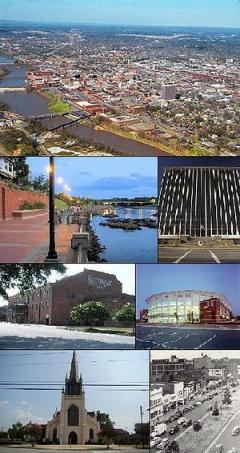

Columbus is a city in and the county seat of Muscogee County, Georgia, United States, with which it is consolidated. As of the 2010 census, the city had a population of 189,885. It is the principal city of the Columbus, Georgia metropolitan area, which had a 2011 estimated population of 301,439, according to the US Census. It joins with the Auburn, Alabama metropolitan area to form the Columbus, Georgia-Auburn, Alabama Combined Statistical Area, which had a 2011 estimated population of 466,089. It is the third largest city and fourth largest metropolitan area in the state, and also the 123rd largest city in the United States.
Columbus lies 100 miles (160 km) south of Atlanta. Fort Benning, a major employer, is located south of the city in Chattahoochee County. The city is home to museums and other tourism sites. The area is served by the Columbus Airport. The current mayor is Teresa Tomlinson, who was elected in November 2010. The city was ranked number 4 on the 100 Best U.S. Cities to live by Best Life Magazine.
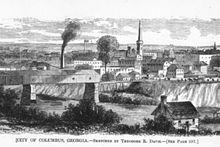
Founded in 1828 by an act of the Georgia Legislature, Columbus was situated at the beginning of the navigable portion of the Chattahoochee River and on the last stretch of the Federal Road before entering Alabama. The city was named for Christopher Columbus, its founders likely influenced by the writings of Washington Irving. The plan for the city was drawn up by Dr. Edwin L. DeGraffenried who placed the town on a bluff overlooking the river. Across the river, where Phenix City, Alabama is now located, Creek Indians lived until their removal in 1836.
The river served as Columbus' connection to the world, particularly connecting the plantations in the region with the international cotton market via New Orleans and ultimately Liverpool, England. The city's commercial importance increased in the 1850s with the arrival of the railroad. In addition, textile mills began springing up along the river, bringing industry to an area reliant upon agriculture. By 1860, the city was one of the more important industrial centers of the South, earning it the nickname "the Lowell of the South," in deference to the industrial town in Massachusetts.
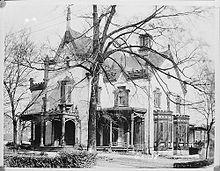
When the outbreak of war came in 1861, the industries of Columbus expanded their production and Columbus became one of the most important centers of industry in the Confederacy. During the war, Columbus ranked second to Richmond in the manufacture of supplies for the Confederate army. In addition to textiles, the city had an ironworks and a sword factory as well as a shipyard for the Confederate Navy. Unaware of Lee's surrender to Grant and the assassination of Abraham Lincoln, Union and Confederates clashed in the Battle of Columbus, Georgia on Easter Sunday, April 16, 1865, when a Union detachment under General James H. Wilson attacked the city and burned many of the industrial buildings. The inventor of Coca-Cola, Dr. John Stith Pemberton, was wounded in this battle. The owner of America's last slave ship, Col. Charles Augustus Lafayette Lamar, was also killed here. A historic marker has been erected in Columbus marking the battle by Wilson's troops as the "Last Land Battle in the War Between the States."
Reconstruction began almost immediately and prosperity followed. Factories such as the Eagle and Phenix Mills were revived and the industrialization of the town led to rapid growth; the city outgrew its original plan. The Springer Opera House was built on 10th Street attracting such notables as Oscar Wilde. The Springer is now the official State Theater of Georgia.
By the time of the Spanish American War, the city saw much modernization including the addition of trolleys extending to outlying neighborhoods such as Rose Hill and Lakebottom and a new water works. Mayor Lucius Chappell also brought a training camp for soldiers to the area. This training camp named Camp Benning would grow into present day Fort Benning, named for General Henry L. Benning, a native of the city.
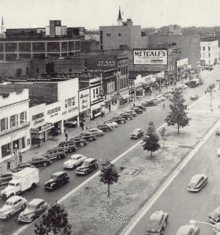
With the expansion of the city, the need for a university saw the establishment of Columbus College, a two-year institution which would later grow into Columbus State University, now a comprehensive center of higher learning. The city would consolidate city and county governments in 1971 and become the first of its kind in Georgia (and one of only 16 in the U.S. at the time). As the city has turned from its initial industry of textiles, it has provided a home for other prominent industries including the headquarters for Aflac, Synovus, TSYS and Carmike Cinemas.
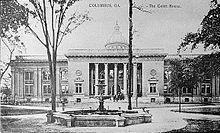
During the 1960s, 1970s and 1980s, urban blight, flight, and prostitution were serious problems in much of downtown Columbus and adjacent neighborhoods. Early efforts to halt the gradual deterioration of downtown began with the saving and restoration of the Springer Opera House in 1965. With the revitalization of the Springer and its subsequent designation as the State Theatre of Georgia, a historic preservation movement was sparked and various historic districts were established in and around downtown. Large tracts of blighted areas were cleaned up and a modern Columbus Consolidated Government Center was constructed in the city center. A significant period of urban renewal and revitalization followed in the mid to late 1990s. With these improvements, residents and businesses began moving back to these formerly blighted areas. Examples of these municipal projects including the construction of a softball complex which hosted the 1996 Olympic softball competition, construction of the Chattahoochee RiverWalk along the Chattahoochee River, construction of the National Civil War Naval Museum at Port Columbus, construction of the Coca-Cola Space Science Center, the expansion of the Columbus Museum, and road improvements to include a new downtown bridge crossing the Chattahoochee River to Phenix City. During the late 1990s, commercial activity expanded north of downtown along the I-185 corridor.

During the 2000s, expansion and historic preservation was continuing throughout the city. An example of this is the revitalization of South Commons, an area which combines the 1996 Olympic softball competition complex, A. J. McClung Memorial Stadium, Golden Park, the Columbus Civic Center, and the recently added Jonathan Hatcher Skateboard Park into a single complex area. Other additions to the city include the National Infantry Museum in South Columbus, located just outside the Fort Benning main gate.
Columbus has also established itself as a center for the fine and performing arts. RiverCenter for the Performing Arts, which opened in 2002, houses Columbus State University's music department. In 2002 Columbus State's art and drama departments moved to downtown locations. Such initiatives have provided Columbus with a cultural niche and with vibrant and modern architecture mixed among older brick facades.
The "Ready to Raft 2012" campaign is a project that will create 700 new jobs and is estimated to bring in $42 million annually to the Columbus area. The project will result in the longest urban whitewater rafting venue in the world, scheduled for completion in 2012.
In upcoming years, it is predicted that there will be an additional 30,000 soldiers trained at Fort Benning each year due to Base Realignment and Closure. As a result of this, Columbus is expected to see a major population increase.
Columbus is one of Georgia's three Fall Line Cities, along with Augusta and Macon. The Fall Line is where the hilly lands of the Piedmont plateau meet the flat terrain of the coastal plain. As such, Columbus has a varied landscape of rolling hills on the north side and flat plains on the south. The fall line causes rivers in the area to decline rapidly towards sea level, making it a good location for textile mills in the past. The Chattahoochee River is the major river that runs through Columbus.
The city is located at 32 °29 a²23 a³N 84 °56 a²26 a³W / 32.489608 °N 84.940422 °W / 32.489608; -84.940422 (32.489608, -84.940422).
According to the US Census Bureau, the city has a total area of 221.0 square miles (572 km2), of which, 216.3 square miles (560 km2) of it is land and 4.7 square miles (12 km2) of it (2.14%) is water.
Columbus has a humid subtropical climate. Daytime summer temperatures often reaches a high in the mid 90s, and low temperatures in the winter average in the upper 30s. Columbus is often considered a dividing line or "natural snowline" of the southeastern United States with areas north of the city receiving snowfall annually, with areas to the south typically not receiving snowfall every year or at all.
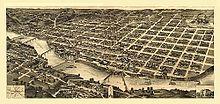
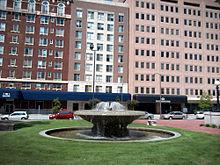
Columbus is divided into five geographic areas, and they are as follows:


The Columbus Metropolitan Area includes four counties in Georgia, and two in Alabama. A 2008 Census estimate showed 287,653 in the metro area, with 442,953 in the combined statistical area. Below are the cities in the Columbus CSA:
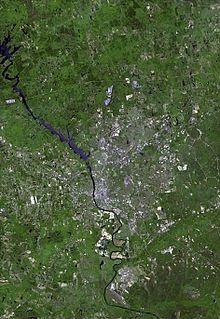
As of the 2010 U.S. Census, Columbus had a total population of 189,885, up from 186,291 in the 2000 Census. The 2010 Census reported 189,885 people, 72,124 households, and 47,686 families residing in the city. The population density was 861.4 people per square mile (332.6/km2). There were 82,690 housing units at an average density of 352.3 per square mile (136.0/km2). The racial makeup of the city was 46.3% White, 45.5% African American, 2.2% Asian,0.2% Native American, 0.14% Pacific Islander, and 1.90% from other races. Hispanic or Latino of any race were 6.4% of the population.
There were 69,819 households out of which 34.6% had children under the age of 18 living with them, 44.7% were married couples living together, 19.6% had a female householder with no husband present, and 31.7% were non-families. 26.7% of all households were made up of individuals and 9.4% had someone living alone who was 65 years of age or older. The average household size was 2.54 and the average family size was 3.08.
In the city the population was spread out with 25.6% under the age of 18, 11.9% from 18 to 24, 29.8% from 25 to 44, 19.7% from 45 to 64, and 11.6% who were 65 years of age or older. The median age was 33 years. For every 100 females there were 94.7 males. For every 100 females age 18 and over, there were 91.6 males.
The median income for a household in the city was $41,331, and the 2000 median income for a family was 41,244. Males had a median income of $30,238 versus $24,336 for females. The per capita income for the city was $22,514. About 12.8% of families and 15.7% of the population were below the poverty line, including 22.0% of those under age 18 and 12.1% of those age 65 or over.
Columbus contains approximately 200 Christian churches, with the Southern Baptist Convention being the largest denomination by number of churches. Columbus is also home to three Kingdom Halls for Jehovah's Witnesses, along with three mosques and two synagogues.
Companies headquartered in Columbus include Aflac, Carmike Cinemas, TSYS, Realtree, Synovus, and the W. C. Bradley Co.
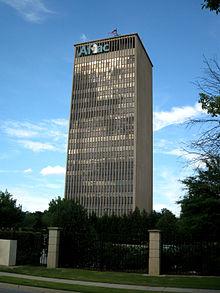
This is a list of the five tallest buildings in Columbus.
According to Columbus's 2009 Comprehensive Annual Financial Report, the top employers in the city are:
Columbus is served by one major indoor shopping mall, Peachtree Mall, which is anchored by major department stores Dillard's, Macy's, and J.C. Penney. The total retail floor area is 821,000 square feet (76,300 m2). Major strip malls include Columbus Park Crossing, which opened in 2003, and The Landings, which opened in 2005. Columbus is also served by The Shoppes at Bradley Park, a lifestyle center.
MidTown contains two of the city's early suburban shopping centers (the Village on 13th and St. Elmo), both recently renovated and each offering local shops, restaurants, and services.

Below is the list of major venues in the city of Columbus:
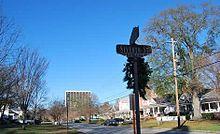
Columbus is home to 8 historic districts, all listed in the NRHP. They are as follows:
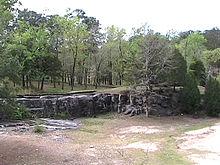
Columbus is home to upwards of fifty parks, four recreation centers, four senior centers and parks, and Standing Boy Creek State Park, a 1,579 acres (6.39 km2) Georgia state park created by the executive order issued by then-Governor Sonny Perdue on January 21, 2004. It offers swimming, boating (on Lake Oliver), camping, hiking, and hunting.
Columbus is home to the following seven golf courses.
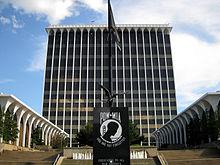
For 2008, Columbus had an overall crime rate of 8,533.7 per 100,000 residents; this exceeds the national average of 4,479.3 crimes per 100,000 people by over 75%. By way of comparison, New York City's overall crime rate was 2,378 per 100,000 residents.
The rate for violent crimes was 620.8 per 100,000, compared to the national average of 553.5 per 100,000; murders and robberies exceeded the national average, while rapes and aggravated assaults were below the national average. Property-crime rates, such as burglaries, larceny and motor vehicle thefts, significantly exceeded the national average (7,229.8 in Columbus, compared to the national average of 3,906.1).
The Muscogee County School District holds grades pre-school to grade twelve, that consists of thirty-five elementary schools, twelve middle schools, and nine high schools. The district has 2,068 full-time teachers and over 32,944 students.
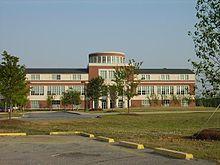
Columbus is served by four branches of the Chattahoochee Valley Libraries:
Columbus is served by the Columbus, Georgia Designated Market Area (DMA). Charter Communications, Comcast, Knology, and Mediacom provide cable television service. DirecTV and Dish Network provide direct broadcast satellite television including both local and national channels to area residents.
The following are public general aviation airports that operate in the metropolitan area:
The following are private general aviation airports that operate in the metropolitan area:
The following is a military aviation airport that operates in the metropolitan area:
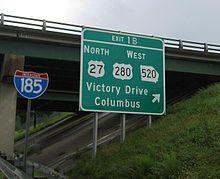
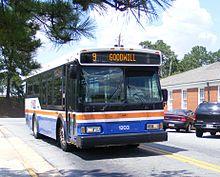
METRA Transit System is the primary provider of mass transportation in Muscogee County, currently operating nine routes in Columbus. The current public transportation services are operated as a function of the Columbus Consolidated Government under METRA.
Greyhound Lines provides intercity bus service with the Columbus station located on Veterans Parkway, Downtown Columbus.
Columbus Airport Shuttle Service provides luxury shuttle service between Columbus, Fort Benning, and the Atlanta Hartsfield International Airport.
Groome Transportation is a ground transportation carrier that operates shuttle and charter services between Columbus and the Atlanta Hartsfield International Airport.
Taxi cab and limousine services are provided by more than two-dozen companies throughout the Columbus area.
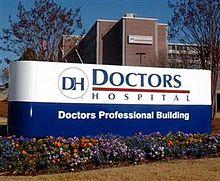
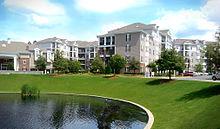
The following people are closely associated with the city of Columbus, or one of its surrounding communities, and have garnered a level of national or international recognition. For a more comprehensive list of notable Columbus natives and residents, see People from Columbus, Georgia.
Columbus has four official sister cities:
Word Count: 3303






